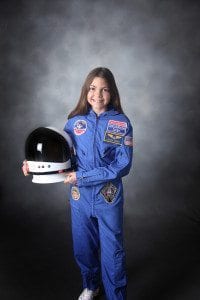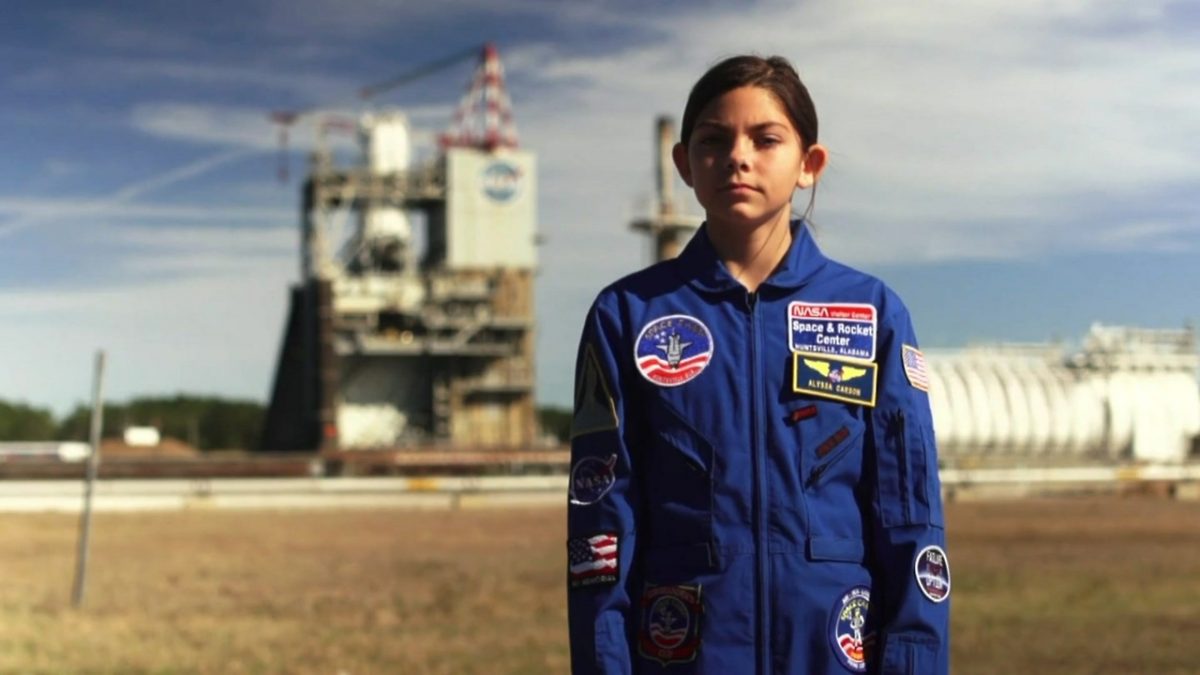Alyssa Carson is one of the most focused children on the planet and may be leaving this one for Mars. Truly an astronaut in training, Alyssa’s already a leader and role-model for people all over the world.
Alyssa Carson has a story that is contagious. In a world where young women rarely gain global popularity for their intelligence and hard work, Alyssa has made a name in the relentless pursuit of her goal: to be the first human on Mars. With the awe-inspiring support of her father, Bert, Alyssa travels around the world delivering speeches on the importance of exploring space, as well as science in general. Just 13, she’s truly a remarkable person. She’s attended every Space Camp in the world, and speaks Chines
Despite knowing nothing about space initially, Bert’s uncompromising support allows Alyssa to pursue her dreams. Now he is a space expert, too. For caregivers and educators, his story is just as inspirational as Alyssa’s. His response to cynics? “The answer is no, no, no! Do you think as a single father I would be pushing my only child to leave this planet and I might never see her again? Obviously, this isn’t the dream future I’d have for my child. This is her dream, and I fully support it and I understand it. When you see the passion that she has in her heart and her head, you have to do it. I can’t say, ‘No I’m not going to let you do this,’” he said.
I&T TODAY: Have you noticed any common reasons kids aren’t more passionate about science?
ALYSSA CARSON: Well, girls in particular, they are usually interested in either math or science at a very young age. As they’re growing up, especially if they have a brother, they’re told, no, let your brother do [it if it’s] something in the science or math field. And parents don’t do it purposefully, but instead of the girl or daughter going to build something, they’ll tell the brother to build it just as a natural instinct. So, they kind of draw girls away from math and science and engineering fields. So, it’s very important that we push girls to science and let them know they can do these fields.
I&T TODAY: Do you have any advice or thoughts for kids that are thinking of doing something in science but are feeling a little intimidated?
ALYSSA CARSON: If you have already chosen that you want to do something in the science field, or are looking how to get into it or looking back on it, don’t let someone tell you that you can’t do it because you are a girl, or because it is in the math and science career. If that’s something you really want to do, then you should do it and not let someone tell you can’t accomplish it. You can.
I&T TODAY: Have you felt challenged? It seems you’ve always been passionate about going to Mars. What keeps that passion going?
ALYSSA CARSON: Well, I first decided I wanted to get into going to Mars when I was 3 years old. I just loved learning about it so much, and I love just the thought of becoming an astronaut. And so that’s just the part of how much passion I have for it and it just never fades. There haven’t been a whole lot of people telling me I can’t do it, but if someone does, I don’t really listen to them because I know it’s my dream.
I&T TODAY: What do you think are the biggest challenges in getting to Mars and staying there?
ALYSSA CARSON: Obviously just the length of time it takes to get to Mars – it’s six months there, which is a really long time. Especially for a mission. Not only would you stay on Mars for a year or two, but it’s six months back. So overall, it’s a two- to three-year mission, so that’s a major challenge. So are some of the necessities, like the food you need to bring for that long. Radiation is another thing, but the different space organizations are slowly coming up with different ideas. Right now, we have about two to three ideas per issue for each problem, so we’re at the point where we’re solving the issues and building the rocket to go to Mars.
I&T TODAY: That’s so exciting.
ALYSSA CARSON: Very!
I&T TODAY: We saw that over 200,000 people applied for a one-way trip to Mars with Mars One. Do you think a lot of people share this dream you have to go to Mars?
ALYSSA CARSON: I think a lot of people have dreams of becoming an astronaut. But one thing is that they don’t really want to work for it. They just kind of want it to be handed to them. The work ethic is a major thing that has to be put in, and it’s not just an easy thing that you can wake up in the morning and go do – just become an astronaut. With the Mars One program about colonizing Mars, I think that’s a great idea to have a colonization and have people actually living on Mars.
I&T TODAY: We watched your TEDx presentation where you say you don’t want humans to suffer the same fate as dinosaurs. Could you talk a little bit about that?
ALYSSA CARSON: Eventually, a single-planet species will become extinct, and eventually the earth will die out because the sun will stop burning. So if we stay here, then we’ll die with it. If we go on to Mars, then that doesn’t absolutely save the human race, because obviously when the sun dies, the whole solar system will die. But going to mars, is the first baby step in sending humans off of earth. Hopefully after Mars, there will be another planet outside the solar system, then outside the galaxy, and so on.










